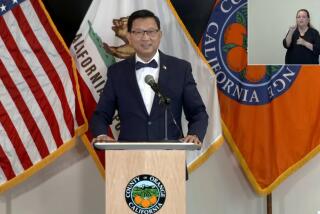Court Declines to Hear Judge’s Bid to Reclaim Seat
SAN FRANCISCO — The California Supreme Court on Thursday declined to hear a bid by former Orange County Superior Court Judge Mark P. Robinson Sr. to reclaim a seat on the bench that he relinquished.
Robinson, citing personal and professional reasons, resigned his post in May, 1984, shortly before the primary election. No candidates appeared on the ballot, so he was certified as the winner of the election by the Secretary of State’s office, which viewed him as an unopposed incumbent.
He attempted to assume the post in January, 1985, but was assigned no judicial duties. A year later Gov. George Deukmejian appointed William McDonald to the judgeship. Robinson filed suit, seeking to regain the office, but a state Court of Appeal panel ruled that he was not properly elected and could not take the post.
The high court, with Justice Stanley Mosk dissenting, declined to review the appellate ruling.
Contacted Thursday, Robinson said he had not been advised of the opinion.
“I would just say that without reading the opinion I can’t comment, other than to say I’m pleased to know that at least one member of the court thought there was validity to our position,” Robinson said.
In another action Thursday, the court refused to block the revocation of a Los Angeles adult theater owner’s permit to show films on charges he knowingly allowed patrons to engage in illegal sexual conduct.
The court, over one dissent, declined to hear claims that revocation of the permit by city officials violated the constitutional rights of the theater owner.
In a brief order, the justices let stand an appellate court ruling that found that while both the state and federal constitutions protected the showing of movies at the theater, the city could still move against the owner to combat lewd conduct on the premises.
Not a Legal Precedent
But the high court also said the appellate decision could not be cited as legal precedent in other cases, thus limiting its impact to the dispute immediately at issue.
The case involved the Valley Adult Theater in North Hollywood, owned by Seung Chun Lim. In April, 1983, undercover Los Angeles police officers began making arrests for illegal conduct by patrons, and Lim was warned that continued arrests could jeopardize his license to show films there.
According to testimony, Lim took some steps to remedy the problem by improving the lighting and posting warnings against lewd conduct. He hired a 70-year-old security guard who occasionally patrolled the aisles with a flashlight but was identifiable only by a piece of cardboard stuck in his cap labeled “guard.”
In 1985, the Police Department sought revocation of Lim’s permit, charging that he knowingly allowed illegal sex acts to be committed on the premises. The Board of Police Commissioners ordered the revocation, and lawyers for the owner took the issue to court, contending that his free-speech rights were being violated.
In March, a panel of the state Court of Appeal in Los Angeles found that city officials did not violate the First Amendment by penalizing a theater owner for allowing illegal activity.
The panel acknowledged that under a 1958 appellate ruling, theater management could not be held responsible for lewd conduct by patrons where it took “all reasonable steps” to prevent such conduct. “However, the key word here is reasonable and what was reasonable (in other cases) is not suffice in this case,” Appellate Justice Arleigh Woods wrote for a unanimous three-judge court.
‘Higher Degree of Supervision’
The court said that in theaters showing pornographic films a “higher degree of supervision” may be required. It was clear that Lim was aware of the need to take “strong preventive measures” at his theater, the court said, and there was substantial evidence he failed to take “vigorous and significant action.”
More to Read
Sign up for Essential California
The most important California stories and recommendations in your inbox every morning.
You may occasionally receive promotional content from the Los Angeles Times.










